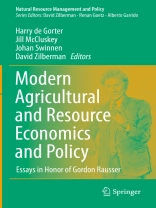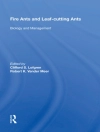This volume celebrates the life and career of Gordon Rausser, pioneer and leader in natural resource economics, while critically overviewing the emerging literature in the field. As the chair of the Agriculture and Resource Economics department at UC Berkeley, Rausser led the transformation of the department from a traditional agricultural economics department to a diverse resource economics department addressing issues of agriculture, food, natural resources, environmental economics, energy, and development. This book builds on this theme, showcasing not only the scope of Rausser’s work but also key developments in the field.
The volume is organized into two parts. The first part speaks about the lessons of Gordon Rausser’s career, in particular, his role as a leader in different spheres, his capacity to integrate teaching and entrepreneurship, and his impact on the world food system. The second part will address some of thesignificant developments in the field he contributed to and how it relates to his work. The chapters include contributions from modern leaders in the economics field and cover diverse topics from many subfields including public policy, public finance, law, econometrics, macroeconomics, and water resources.
Providing an excellent reference, as well as a celebration of a pivotal figure in the field, this volume will be useful for practitioners and scholars in agricultural and resource economics, especially the many individuals familiar with Gordon Rausser and his career.Tabla de materias
Part 1. Gordon Rausser: Scholar, Leader and Entrepreneur.- Chapter 1. On the Essence of Leadership: Lessons from Gordon Rausser.- Chapter 2. Scholar, Entrepreneur and Editorial Innovator.- Chapter 3. Gordon Rausser: Impacts on the World Food System.- Chapter 4. Gordon Rausser and the Transformation of Agricultural Economics from the 1960s to the 1980s.- Part 2. Major Developments in Agricultural, Food and Resource Economics.- Chapter 5. Principles of Policy Modeling in Agriculture.- Chapter 6. Woke Farm and Food Policies in the Post-Truth Era: Calamitous Consequences for People and the Planet.- Chapter 7. The Future of Food Economics.- Chapter 8. Closing the Gap between Water Needs and Renewable Water Supplies: Global Perspective and Local Lessons.- Chapter 9. Remote Sensing Technologies: Implications for Agricultural and Resource Economics.- Part 3. Major Developments in Institutional Economics and Political Economy.- Chapter 10. Special Interests and the Public Interest in Public Policy and Information: Insights from Agricultural and Food Policies.- Chapter 11. The Evolution of Political Hyperbole and Polarization: Echo Chambers and Voter-Elite Feedback Loops.- Chapter 12. The Puzzle of Lagging Sub-Saharan Africa Agriculture: Toward a Theory of Connectedness.- Chapter 13. Control of the Research Agenda in University-Industry Partnerships.- Chapter 14. Econometrics in Law and Economics: Challenges at Class Certification.- Part 4. Major Developments in Macroeconomic Linkages, Futures Markets, and Commodity Systems.- Chapter 15. Macroeconomic Linkages to the Agricultural Supply Chain.- Chapter 16. The Theory of Normal Backwardation and Financialization of the Futures Markets.- Chapter 17. Causes of the Great Food Commodity Price Booms in the New Millennium.- Chapter 18. Economics and Policy Implications of Contracts in Agriculture.- Chapter 19. How Gordon Rausser’s Legacy will Influence the Way Forward.
Sobre el autor
Harry de Gorter is Professor in the Dyson School of Applied Economics and Management, Cornell University (US). His research focus is on agriculture and trade policy with recent work on food waste, biofuels, and agricultural trade reform and the Doha Development Agenda, especially the impact of subsidies and protection on developing countries. He has long been actively involved in advising many governments and organizations on issues related to agriculture trade policy including the EU, FAO, G-20, IMF, OECD, UNCTAD, World Bank and WTO.
Jill J. Mc Cluskey is Regents Professor at Washington State University (US) and Director of the School of Economic Sciences, which includes both General Economics and Agricultural and Resource Economics. Mc Cluskey’s research focuses on product quality and reputation, sustainable labeling, consumer preferences for new technology, and representation of women in STEM. She is past President and Fellow of the Agricultural and Applied Economics Association (AAEA) and Fellow of the Western Agricultural Economics Association.
Johan Swinnen is Director General of the International Food Policy Research Institute (IFPRI) in Washington, DC (US). Prior to joining IFPRI, Dr. Swinnen was professor of economics and director of the LICOS Centre for Institutions and Economic Performance at KU Leuven (Belgium) and senior research fellow at the Centre for European Policy Studies in Brussels. He was a lead economist at the World Bank from 2003 to 2004 and economic adviser to the European Commission from 1998 to 2001. David Zilberman is a Professor and holder of the Robinson Chair in the Department of Agricultural and Resource Economics, UC Berkeley. His areas of expertise include agricultural and environmental economics and policy, water, marketing, risk management, the economics of innovation, natural resources, biotechnology, and biofuels. He is past President of the Agricultural & Applied Economics Association (AAEA). He was the 2019 recipient of the Wolf Prize in Agriculture.












